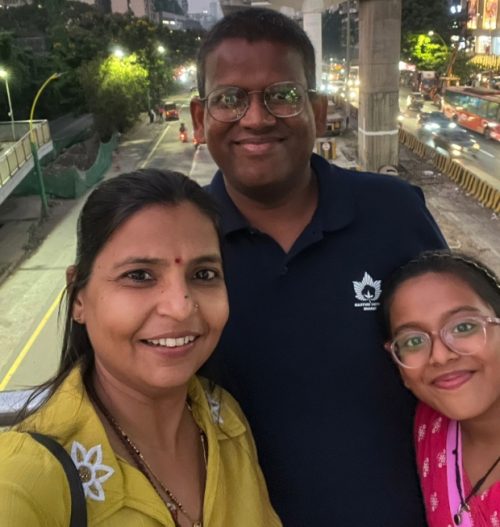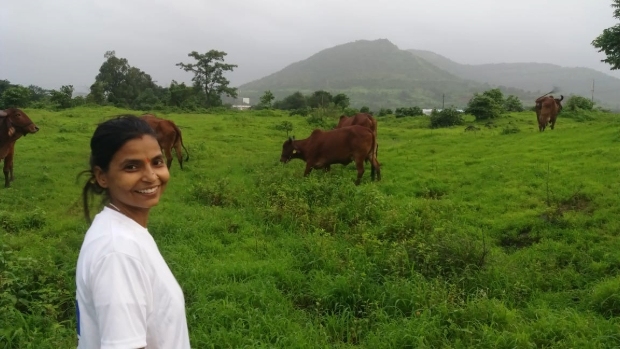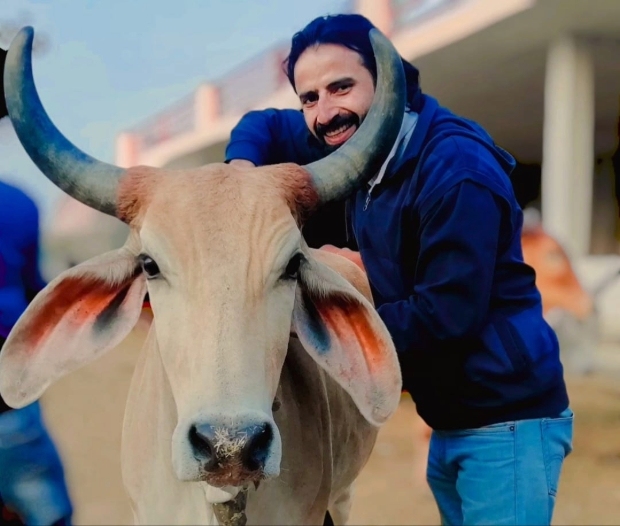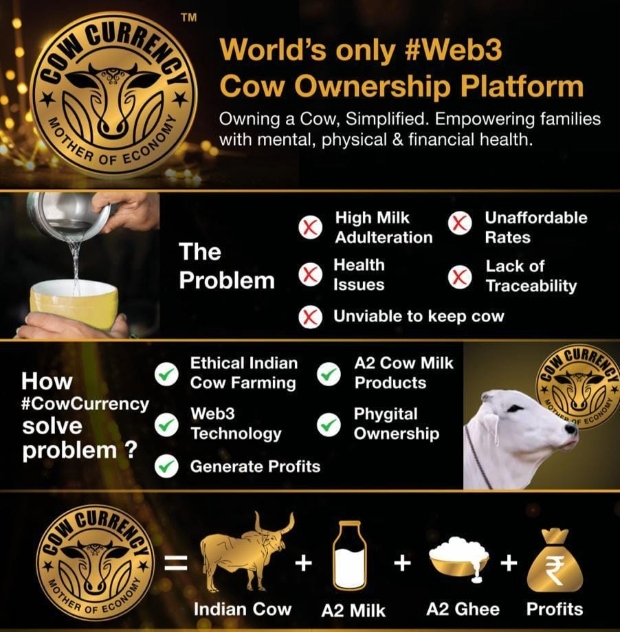When Jyoti Padma’s infant daughter was diagnosed with lactose intolerance, it set her on an unexpected path that would revolutionise urban access to pure milk through a unique model — ‘Cow Currency’.
“I was astonished when my infant daughter was diagnosed with lactose intolerance. None of our family members have it, which piqued my curiosity on how this could have happened,” Jyoti tells The Better India.

Determined to provide her daughter with essential nutrients, Jyoti explored various milk brands and locally sourced options. However, her child’s body rejected every attempt. A breakthrough came in 2018 when her sister from Lucknow sent milk from her farm. To Jyoti’s surprise, her daughter digested it without any issue.
This was a pivotal revelation for Jyoti. She had been searching for the cause of her daughter’s struggles, only to realise that the problem had been the milk all along! “Packaged and processed milk is a bad option for her,” she says.
However, even local dairy farms fell short due to hygiene issues or subpar feed given to cows. Resolving to find a solution, Jyoti, a textile engineering graduate, embarked on a self-learning journey. “I don’t have a farming background. All that I have implemented is through trial-and-error and self-learning,” she recalls.
Jyoti set up her first farm in Lucknow with 15 mixed-breed cows, including Jerseys and Sahiwals. However, her limited knowledge of cow nutrition affected the quality of the milk. After relocating to Thane, Jyoti identified a pressing need for pure A2 cow milk in urban areas. “I grew up in Uttar Pradesh, where getting fresh milk was never a worry. When my daughter needed pure milk here, I realised it’s a necessity, not a luxury,” she explains.
As per a research study published in the National Library of Medicine, A2 milk — milk that only contains a variant of beta-casein called A2 — has on several occasions proved to be a beacon of hope for lactose intolerant people. The difference in protein between the A2 and A1 varieties makes the former a more easily digestible option.
A holistic approach to dairy farming
In 2019, Jyoti established Sree Balkrishna Dairy Farm (BKD Milk) on two acres of leased land on the outskirts of Maharashtra. With her husband’s support, she envisioned a farm where cows would roam freely, nourished by organic feed like 5G Napier grass, wheatgrass, and millets. The focus was clear: to produce A2 milk, free from adulteration and harmful chemicals.
A strong advocate for ethical and humane farming practices, Jyoti insists on hand milking, ensuring that the milk reaches consumers’ homes within hours.
“Certain farmers inject an injection worth Rs 20 to the cow, which affects the nervous system, causing the cow to produce milk for 48 hours straight,” Jyoti explains. “This, in turn, causes harmful health issues for consumers, probing early changes like puberty way ahead of time. At BKD Milk, we prioritise the well-being of our cows and the purity of our milk.”

Today, BKD Milk serves over 200 customers daily, and Jyoti’s innovative approach to dairy farming has garnered significant attention. Her dedication to quality, sustainability, and ethical practices is inspiring a new generation of farmers and consumers alike.
“There’s no machine intervention in this process,” Jyoti proudly shares. Today, the farm serves over 200 customers daily and generates an annual turnover of Rs 1 crore.
Introducing Cow Currency
Building on the success of BKD Milk, Jyoti and Parikshit Sampal Sai, a farming enthusiast who aims to make agriculture an organised sector, launched Cow Currency — an innovative venture designed for urban households longing for pure dairy products. The model allows consumers to own a cow without managing its daily care.
Parikshit has implemented around 29 pilot projects to date, focusing on technological intervention in agriculture, ‘Pranam Kisan’ being one of his notable works. He had come up with the idea of such a model and had been planning to implement it since 2017.

“Jyoti’s husband is my friend and when I got to know she had established a dairy farm, I wanted to make use of the opportunity. When Jyoti was interested as well, I was happy,” says Parikshit. After contemplating for a long time, the duo decided to get involved with Cow Currency.
“I personally believe a woman can provide the right guidance for a business venture. Women are Lakshmi for me. And for Cow Currency, it is Jyoti,” he says.
For an initial investment of Rs 1,08,000, customers own a cow for three years. The farm takes full responsibility for the cow’s maintenance, feeding, and healthcare. In return, customers receive two litres of fresh A2 milk daily and two kilograms of ghee every month, delivered to their homes. “Even if a customer is in a different state, we courier the ghee, and the milk expense is credited to their account,” shares Jyoti.
Despite a cow’s natural four-month dry period each year, Cow Currency guarantees an uninterrupted milk supply by pooling resources from multiple cows. “This makes the model affordable, with milk costing just Rs 45 per litre,” explains Parikshit. After three years, customers also receive Rs 22,000 as an end-of-term payout, encouraging long-term participation.
The customers are provided with a proper breed certificate of the cow and its genetic parents to ensure the purity of the breed. In fact, customers are welcome to meet their pet cow whenever they wish. “I was able to play with Radha on the farm, and the feeling of owning a cow is something unexplainable,” shares Simple H Singh, a resident of Pune.
Fulfilling urban needs
For customers like Puspanjali Dutta, the ‘Cow Currency’ model rekindles childhood memories. “I missed drinking pure cow’s milk after moving to the city,” she says, adding, “Now, I have the satisfaction of drinking milk from my own cow, which I’ve named Rivan.”
“People in urban cities do not have the time or space to care for the cow. This model fulfils that in the best way possible,” Puspanjali shares.
Simple, who has Celiac disease, highlights the product’s health benefits. “Packaged milk always causes allergic reactions for me. But for the past six months, I’ve had no issues with their milk,” she says.

Ethical treatment of cows is at the heart of Cow Currency’s philosophy. “Cows are often abandoned or sent to slaughterhouses when they stop producing milk. We ensure every cow has a safe and respectful life beyond its milking period,” Parikshit, who has over 18 years of farming experience, explains.
In its pilot phase, Cow Currency operates with 25 staff members per farm and already serves over 70 satisfied customers. The duo plans to expand to 75 farms across India, enabling more people to reconnect with ethical, high-quality dairy products.
Jyoti’s journey from a concerned mother to a successful entrepreneur is a testament to her unwavering dedication to quality and sustainability. Her ventures not only meet the growing demand for pure dairy products but also champion ethical farming practices. As she proudly states, “We strive to ensure our cows are happy and healthy, and our customers feel connected to the source of their food.”
“Real wealth is owning a cow,” Parikshit concludes.
Edited by Arunava Banerjee; All images courtesy Jyoti and Parikshit

No comments:
Post a Comment